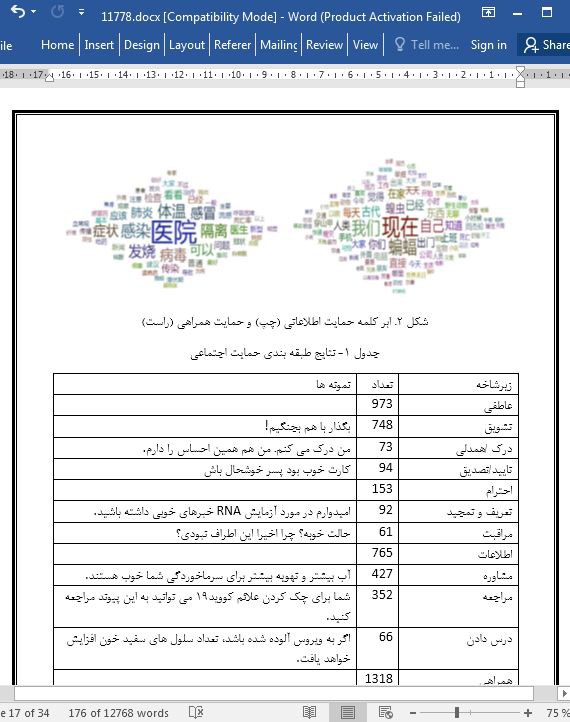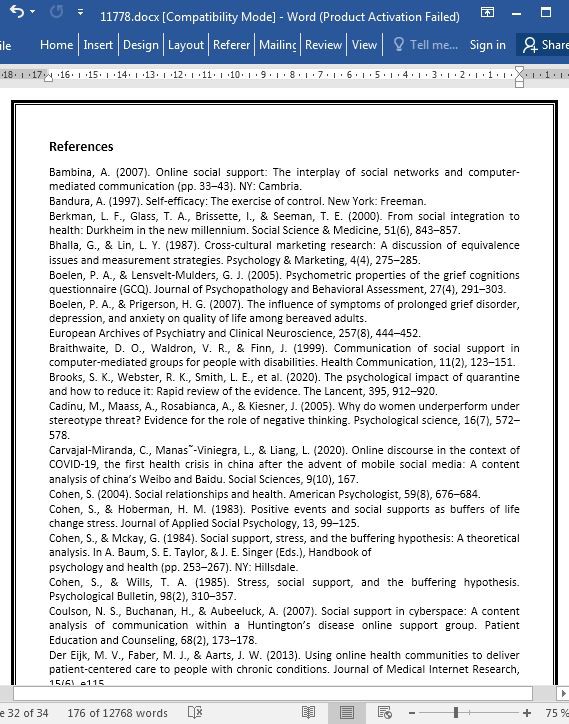
تاثیر حمایت اجتماعی آنلاین بر باور مردم نسبت به غلبه بر کووید 19
چکیده
شیوع ناگهانی بیماری کرونا ویروس ۲۰۱۹ (کووید 19) در اوایل سال ۲۰۲۰، زندگی مردم را به طرز چشمگیری تغییر داده است. برخی کشورها برای کنترل این ویروس، قرنطینه خانگی را به طور گسترده اعمال کرده اند. با این حال اثرات جانبی قرنطینه به ندرت در تحقیقات فعلی کووید 19 مورد بررسی قرار گرفته است. بنابراین این مطالعه با استفاده از شناخت و احساسات افراد در طول این بیماری همه گیر، به بررسی اثرات حمایت اجتماعی آنلاین بر باورهای عمومی غلبه بر کووید 19 می پردازد. در ابتدا این مطالعه با بررسی و تحلیل محتوای پیام های پست شده در "Baidu COVID-19 bar" ، پنج نوع حمایت اجتماعی آنلاین ارائه شده یا دریافت شده توسط مردم در طول کووید19 را شناسایی کرد. بر این اساس، مدلی که باورهای عمومی را توضیح می داد، از دیدگاه حمایت اجتماعی آنلاین، شناخت و احساسات ایجاد شد. ۳۳۴ پرسشنامه آنلاین معتبر برای بررسی مدل پیشنهادی و فرضیه ها جمع آوری شد. نتایج نشان می دهند که شناخت تاثیر مستقیمی بر باور دارد، در حالی که احساس از طریق اثر واسطه ای کامل شناخت، بر باور تاثیر می گذارد. حمایت ملموس و اعتبار می تواند به طور مستقیم بر باورهای مردم تاثیر بگذارد و سطح تحصیلات به طور قابل توجهی این تاثیرات را تعدیل می کند. علاوه بر این، شناخت عمومی تحت تاثیر حمایت اطلاعاتی است، با این حال احساسات تحت تاثیر حمایت اجتماعی نیست بلکه تحت تاثیر عوامل دیگر است (برای مثال، افشای اطلاعات، تامین مواد و سرخوردگی ناشی از این بیماری همه گیر). این نتایج پژوهشی، بینش عمیقی را در مورد چگونگی کاهش اثرات منفی قرنطینه، تحکیم مبنای نظری باورهای عمومی ایجاد می کند و پیامدهای عملی مهمی برای افراد و دولت در برخورد با چنین شرایط اضطراری دارد.
1. مقدمه
در سال ۲۰۲۰، نوع جدیدی از کرونا ویروس باعث شیوع بیماری همه گیر در جهان شد که سازمان بهداشت جهانی (WHO) آن را بیماری کرونا ویروس ۲۰۱۹ (کووید19) نامید. سازمان بهداشت جهانی کووید19 را یک وضعیت اضطراری بهداشت عمومی اعلام کرده است و خواستار توجه و حمایت جهانی شده است. تا ۳ آوریل ۲۰۲۰، تعداد 1,011,193 مورد تایید شده و ۲۰۷ کشور دارای مورد مبتلا بودند. مقامات چینی برای جلوگیری از گسترش کنترل نشده این ویروس، اقدامات فوری و سفت و سختی را در زمینه بهداشت عمومی انجام داده اند، از جمله ممنوعیت و قرنطینه خانگی. خوشبختانه این اقدامات به خوبی عمل می کنند و به جلوگیری موثر گسترش کنترل نشده کمک می کنند. در ۳ آوریل ۲۰۲۰، تعداد 1,562 مورد تایید شده در چین باقی ماندند.
6.3 محدودیت ها و تحقیقات آینده
این مطالعه به بررسی این موضوع پرداخت که چه عواملی بر باور مردم برای غلبه بر کووید19 تاثیر می گذارند و این عوامل چگونه بر آن تاثیر می گذارند. حمایت اجتماعی آنلاین، احساسات و شناخت، در شرایط قرنطینه انبوه بررسی شد. اگرچه این مطالعه یافته های اولیه و امیدوار کننده ای دارد، اما محدودیت هایی نیز وجود دارد. ابتدا اینکه ما داده ها را به صورت آنلاین جمع آوری کردیم و پرسشنامه های آنلاین به طور تصادفی پخش شدند. این امر منجر شد که بیشتر پاسخ دهندگان ما از مناطقی با ریسک بیماری همه گیر متوسط یا پایین بودند، زیرا این مناطق در چین نسبت بیشتری دارند. تعداد افراد در مناطق پرخطر در این مطالعه محدود بود. بدون شک، افراد واقع در مناطقی با سطوح ریسک مختلف، شناخت، احساسات و یا رفتارهای متفاوتی نسبت به کووید19 دارند. بنابراین، نتایج حاصل از این مطالعه برای نواحی با خطر متوسط یا پایین سودمندتر و عملی تر هستند، در حالی که تعمیم نتایج به نواحی با خطر بالا نیاز به اعتبارسنجی بیشتر دارد.
Abstract
The sudden outbreak of coronavirus disease 2019 (COVID-19) in early 2020 has dramatically changed people's lives. Some countries have taken mass home quarantine to control the virus. However, the side effects of quarantine have rarely been interrogated by current COVID-19 research. This study thus investigates the effects of online social support on the public's beliefs in overcoming COVID-19 by embracing their cognition and emotion during the epidemic. First, by crawling and content analysis of the messages posted on "Baidu COVID-19 bar1", this study identified 5 types of online social support given or received by the public during COVID-19. On this basis, a model explaining the public's beliefs was developed from the perspectives of online social support, cognition and emotion. 334 valid online questionnaires were collected to examine the proposed model and hypotheses. The results show that cognition has a direct effect on the belief, while emotion affects the belief via a full mediating effect of cognition. Tangible support and esteem support can directly affect the public's beliefs, and educational level significantly moderates these effects. In addition, the public's cognition is influenced by informational support, however, emotion is not influenced by social support but by other factors (e.g., information disclosure, material supplies and frustration caused by the epidemic). These research results provide a deep insight into how to reduce the negative effects of quarantine, consolidate the theoretical basis of the public's beliefs, and have important practical implications for individuals and the government in dealing with such emergencies.
1. Introduction
In 2020, a new type of coronavirus, named coronavirus disease 2019 (COVID-19) by the World Health Organization2 (WHO), had caused a pandemic outbreak in the world. WHO has declared COVID-19 a public health emergency and has called for global concern and support. As of April 3, 2020, there were 1,011,193 confirmed cases and 207 countries with cases3 . To prevent the uncontrolled spread of the virus, Chinese authorities have taken prompt and rigid public health measures, including lockdown and home quarantine. Fortunately, these actions function well and help to effectively prevent uncontrolled spread. On April 3, 2020, 1,562 confirmed cases remained in China4 .
6.3. Limitations and future research
This study investigated what factors influence the public’s belief to overcome COVID-19 and how these factors exert that influence. Under the mass quarantine context, online social support, emotion, and cognition were embraced. Although this study has initial and promising findings, there are some limitations. First, we collected data online, and the online questionnaires were diffused randomly. This leads to a deficiency that most of our respondents were from areas with middle or low risk for the pandemic because these areas are in higher proportion in China. The number of people in high-risk areas in this study was limited. Undoubtedly, individuals located in areas with different risk levels have different cognition, emotions or behaviors toward COVID-19. Therefore, the results from this study are more beneficial and practical for areas with middle or low risk, while generalization of the results to areas with high risk requires further validation. Future research could focus specifically on citizens in high-risk areas to reveal the perception and behavior of people there.
چکیده
1. مقدمه
2. مروری بر ادبیات
2.1 حمایت اجتماعی
2.2. احساسات و شناخت
2.3 باور
3. توسعه فرضیه ها
4. روش ها
4.1 کسب و شناسایی حمایت اجتماعی آنلاین
4.2 طراحی پرسشنامه و جمع آوری داده ها
5. تجزیه و تحلیل داده ها و نتایج
5.1 مدل اندازه گیری
5.2 آزمون فرضیه ها
5.3 تحلیل و بحث بیشتر
6. نتیجه گیری
6.1 یافته های اولیه
6.2 مفاهیم نظری و عملی
6.3 محدودیت ها و تحقیقات آینده
ضمیمه
منابع
Abstract
1. Introduction
2. Literature review
2.1. Social support
2.2. Emotion and cognition
2.3. Belief
3. Hypotheses development
3.1. Social support and belief, emotions and cognition
3.2. Emotions, cognition and belief
4. Methods
4.1. Acquisition and identification of online social support
4.2. Questionnaire design and data collection
5. Data analysis and results
5.1. Measurement Model
5.2. Hypotheses testing
5.3. Further analysis and discussion
6. Conclusions
6.1. Primary findings
6.2. Theoretical and practical implications
6.3. Limitations and future research
Acknowledgments
Appendix A. Constructs and measurements
Appendix B. Measurements of other factors that affect negative emotion
References
- اصل مقاله انگلیسی با فرمت ورد (word) با قابلیت ویرایش
- ترجمه فارسی مقاله با فرمت ورد (word) با قابلیت ویرایش، بدون آرم سایت ای ترجمه
- ترجمه فارسی مقاله با فرمت pdf، بدون آرم سایت ای ترجمه



